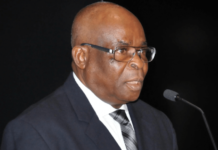
(adsbygoogle = window.adsbygoogle || []).push({});
Retired Col. Hameed Ali was sitting gently on his sofa and
watching TV on August 27, 2015 when some news flashed on the screen: he
had been appointed the comptroller-general of the Nigeria Customs
Service (NCS). He was shocked. The previous day, he was with President
Muhammadu Buhari and had not the slightest idea that he was going to be
appointed CG. As a long-time associate of the president, Ali was
expecting to be made chief of staff — a position he had served Buhari
for years in various presidential campaigns — or chairman of the
Economic and Financial Crimes Commission (EFCC). He could not make sense
of the customs appointment.
heavily disappointed. He refused to get in touch with Buhari for nearly
two weeks. He wanted to turn down the job, according to those who were
close to him. The rumour was that he had actually turned down the job.
For weeks, David Atte, a deputy comptroller-general, held the fort to
fill the vacuum left by Abdullahi Dikko Inde’s retirement. Rumours that
Ali had rejected the appointment were not helped by his refusal to make
public comments or report for duty. It took the intervention of many top
APC politicians from the north to sway the former military
administrator of Kaduna state.
told him how NCS was one of the most corrupt government agencies in the
world. Ali hates the word “corruption”. Any assignment to tackle
corruption would get him excited any day. As a military administrator in
a very corrupt system, he had the distinction of riding the same
weather-beaten car for 10 years after leaving office. This is not a
typical Nigerian story. Maybe that was what Buhari saw in him and
decided to saddle him with the customs job. It was one of those
appointments in the early days of this government that made people think
“change” was for real.
north-east explained to Ali that NCS was one of the biggest
revenue-generating agencies. The Nigerian National Petroleum Corporation
(NNPC) is the king in the ring. Then the Federal Inland Revenue Service
(FIRS). And the Nigerian Communications Commission (NCC). And the
Nigeria Customs Service. “If you clean up customs,” the senator
reportedly told him, “then you are cleaning up Nigeria… Nigerians will
feel the impact instantly.” He was promised a team of experts and
consultants to guide him through this strange territory — to help him
navigate the intricacies in a dirty world laden with explosives and
mafias. He then changed his mind.
presume, is that it would be lovely for him to wear the jersey. You are
the No. 1 customs officer in Nigeria, you enjoy all the powers and perks
of office, you make all the policy pronouncements, you do and undo —
and then claim that because you retired as a military officer, you
cannot wear the uniform. You retired as a colonel, yet a man who retired
as a major general, Anthony Hananiya — by far your senior — wore the
uniform of the Federal Road Safety Commission (FRSC) as corps marshal
under a military regime. The least demand you can make of a CG is to
show that he is proud of the jersey. It doesn’t look that complicated in
my view.
issue: Ali’s directive that all motorists must produce evidence of
import duty paid on cars bought before 2015. This is certainly one of
the most repressive directives ever issued by a government agency. There
is no country in the world where that happens. It is called import duty
for a purpose — it is the importer that has to show evidence that the
importation followed due process. If I walk up to a car dealer and buy a
car, I am an end user having nothing to do with the importation
process. Why compound the woes of Nigerian motorists who are already
battling with bad roads and high cost of spare parts?
world was Ali thinking when he came up with this directive? Is it to
combat smuggling? Where in the world does customs collect import duty on
highways? If you want to combat smuggling, maybe you should pay more
attention to your borders. There are more intelligent and brain-tasking
ways of doing it in this age and time. The lazy way out is to set a trap
for unsuspecting motorists by allowing extortionist customs officers to
terrorise them on the highways. The original date of enforcement
coincides with Easter — and you can imagine the massive disruption to
travel at that particular period. Everything is wrong with the idea.
(adsbygoogle = window.adsbygoogle || []).push({});
this oppressive directive is restored (it has only been temporarily
suspended, we were told), then customs will stop you one day and demand
the import duty on your mobile phone. It may sound ridiculous, but it is
the same principle — the phone was imported and unless you show
evidence that you paid import duty, it will be impounded. That is how it
starts. Give customs an inch and they will take a yard. They will soon
start asking for evidence of import duty on your shirts, shoes and
wristwatches. After all, it is not only cars that are smuggled into the
country. Why then is import duty on cars the focus of the directive?
Ali was not properly prepared for the customs job has been very evident
in the way he has been going round in circles. Today, he will announce a
ban on the land importation of rice into the country. Tomorrow, he will
reverse the ban and set up border posts for payment of duties on
imported rice. The day after tomorrow, he will say the ban is restored.
These ill-conceived policies make us a laughing stock in the world. It
is one thing for the government to say it wants to make doing business
in Nigeria “easy” apparently to please the World Bank and international
investors, but it is another thing entirely that we flip-flop on
policies with relish.
is a complete distraction. The senate has left the real issue of “import
duty” and is now more obsessed with “uniform on duty”. If I were Ali, I
would wear the uniform to the senate and put the devil to shame. I
won’t die because of a “dirty” uniform. I would just go back home and
wash myself with warm water and Dettol thereafter. But Ali is so rigid
he would not contemplate such a thing. His nickname is “Netanyahu” or
“Mr No Compromise” — after the stubborn Israeli prime minister, Benjamin
Netanyahu. Remember Ali was in the military police. He was
provost-marshal of the army at some point. You don’t mess around with
him.
arrogance. Some (not all) of these military guys think they are superior
to every other human being. They used to call us “bloody civilians”
when they were in power. The mentality has not changed. That is why a
band of soldiers would brutalise a physically challenged man for wearing
a “camouflage” and all they got as punishment was a slap on the wrist.
Some years ago, soldiers burnt down the police barracks at Ojuelegba,
Lagos, and nothing came out of it. They think they can do anything and
get away with it. So how on earth can you force a whole retired colonel
to wear the uniform of customs? Infra dignitatem!
real issue, in the final analysis, is Ali’s performance as CG. That is
my own worry. He’s fighting corruption in the service quite all right,
but as Nigerians now know, fighting corruption is not a substitute for
good policies and good governance. Ali keeps getting things wrong,
moving from one bad idea to the other. This has the potential to do more
damage to the economy. He can wear the CG uniform for all we care and
hate corruption perfectly, but the ultimate indicator of his success
will be how well he is leading the very important agency in this age and
time when the economy needs to stand on strong footing. Is he up to the
task? That’s the question.
Simon Kolawole is the publisher of thecable.ng











